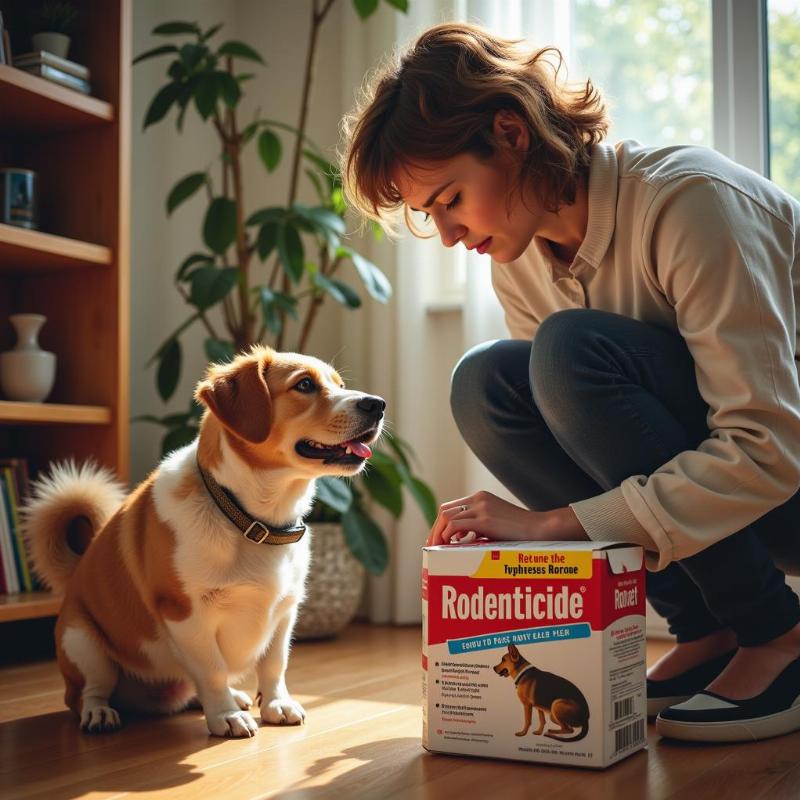Keeping your home rodent-free is important, but so is the safety of your beloved canine companion. Choosing a mice killer safe for dogs can be a daunting task with so many products on the market. This article provides essential information on how to eliminate mice while safeguarding your furry friend’s health. We’ll explore safe rodent control methods, discuss the dangers of common rodenticides, and provide valuable tips for preventing infestations in the first place.
Understanding the Dangers of Common Rodenticides
Many common rodenticides contain ingredients toxic to dogs, such as anticoagulants (bromadiolone, brodifacoum, difenacoum, warfarin) and cholecalciferol. These poisons can cause internal bleeding, seizures, kidney failure, and even death if ingested by your dog. Even indirect exposure, such as consuming a poisoned rodent, can be hazardous. Recognizing the symptoms of rodenticide poisoning, which include lethargy, loss of appetite, vomiting, pale gums, and difficulty breathing, is crucial for timely veterinary intervention.
 Dangers of Mice Killer for Dogs
Dangers of Mice Killer for Dogs
Safe Rodent Control Methods for Dog Owners
Prioritizing your dog’s safety when dealing with a mouse infestation is paramount. Several safe and effective rodent control methods minimize the risk to your furry friend. Trapping is a popular option, offering a targeted approach to eliminate mice without using poison. Snap traps, glue traps, and live traps are available, each with its own pros and cons. Remember to place traps strategically in areas inaccessible to your dog.
Another effective method is using natural deterrents. Certain scents, such as peppermint oil and cloves, are known to repel rodents. Soaking cotton balls in these essential oils and placing them in strategic locations can discourage mice from entering your home. Be mindful of your dog’s sensitivity to strong smells and use these deterrents in well-ventilated areas.
Preventing Mouse Infestations: Proactive Measures for a Rodent-Free Home
Prevention is always the best approach. Maintaining a clean home is the first line of defense against mice. Regularly sweep, vacuum, and mop floors, paying particular attention to areas where food crumbs might accumulate. Store food, including pet food, in airtight containers. Seal any cracks or holes in your home’s exterior that might serve as entry points for rodents. Keeping your yard tidy, including removing debris and trimming overgrown vegetation, also helps deter mice.
Choosing Dog-Safe Rodenticides: What to Look For
While trapping and natural deterrents are preferred, if you opt for a rodenticide, ensure it’s specifically labeled as dog-safe. Look for products containing ingredients like bromethalin, which poses a lower risk to dogs than anticoagulants or cholecalciferol. However, even with “dog-safe” rodenticides, caution is advised. Always follow the manufacturer’s instructions carefully and place the bait in areas inaccessible to your dog.
Professional Pest Control: When to Call the Experts
For severe infestations, consider contacting a professional pest control service. Inform them about your dog and inquire about pet-safe treatment options. They can assess the situation, recommend appropriate measures, and implement effective strategies to eliminate mice while ensuring your pet’s safety.
Conclusion
Protecting your furry friend while keeping your home rodent-free is achievable. By understanding the dangers of common rodenticides, employing safe rodent control methods, and taking preventative measures, you can create a safe and healthy environment for both you and your beloved dog. Choosing a mice killer safe for dogs requires careful consideration. Prioritize your dog’s well-being by exploring safe alternatives and consulting with professionals when necessary.
FAQ
- What should I do if my dog ingests rodenticide? Immediately contact your veterinarian or the ASPCA Animal Poison Control Center.
- Are all traps safe for dogs? While traps are generally safer than poison, use caution with glue traps, as they can harm your dog if they get stuck. Opt for snap traps placed in inaccessible areas.
- How effective are natural deterrents? Natural deterrents can be effective in repelling rodents, but their efficacy varies depending on the severity of the infestation.
- What are the signs of a mouse infestation? Droppings, gnaw marks, and a musty odor are common signs of a mouse infestation.
- How often should I clean my home to prevent mice? Regularly sweeping, vacuuming, and mopping, especially in areas where food is prepared or stored, is essential for preventing infestations.
- Are there any dog-safe rodenticides available? While some rodenticides are marketed as “dog-safe,” always exercise caution and consult your veterinarian before using any rodenticide around your pet.
- When should I call a professional pest control service? Consider contacting a professional for severe infestations or if you are unsure about the best course of action.
Beautdogs.us is your trusted source for comprehensive dog care information, breed insights, and product recommendations. We’re dedicated to empowering both new and experienced dog owners across the US with expert advice, helping them navigate the joys and challenges of pet parenthood. For more helpful tips and resources, explore our website and contact us with any questions. Email: [email protected] Phone: +1 501-555-7529. Beautdogs.us is your one-stop destination for all things dog-related.